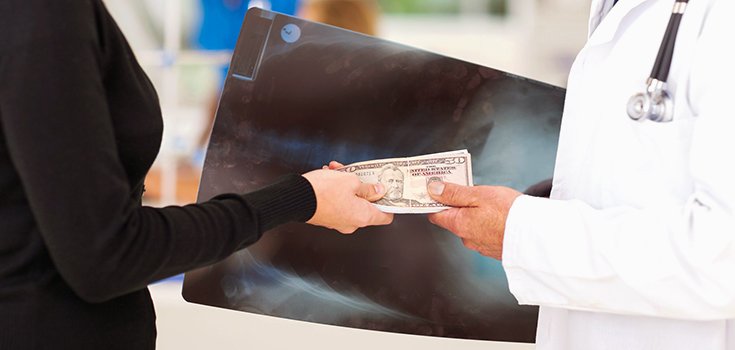Bayer Paid Out Millions to Doctors to Promote Essure Birth Control Device

In mid-July, pharmaceutical giant Bayer announced it would stop selling its Essure birth control device citing a dwindling market, but I’m wondering if it’s actually because thousands of women claim the device caused them severe pain and lifelong injuries. Over the years, the U.S. Food and Drug Administration (FDA) expressed concerns about Essure and issued a handful of warnings about the risks associated with it.
Trailer of a related documentary about the crimes of Big Medical.
A new CNN analysis of federal data shows that from August 2013 through December 2017, Bayer paid 11,850 doctors $2.5 million in consulting fees and similar services related to Essure.
One Indiana physician, Dr. Cindy Basinski, was paid $168,068 for consulting fees and similar services from August 2013 through the end of 2017.
There is nothing illegal about the payments, but they certainly do pose questions about the ethics of paying doctors substantial sums to promote a product.
About 80% of the money Bayer paid out to Indiana doctors went to Basinski alone, making her the second highest-paid doctor for the service. She is one of only 3 doctors to earn more than $100,000, according to CNN.
The news network gathered the information from a federal database that covers August 2013 through the end of 2017, but Basinski cashed in on Essure about 5 years before that. She says she doesn’t remember what she was paid during those years.
“I will tell you that my best guess is that early on it was very minimal, $5,000 to $7,000 a year.”
And despite the thousands of reports from women alleging the device caused them harm, Basinski says she is still convinced that the device is safe and has no plans to stop implanting it in women until Bayer officially takes it off the market.

A Bad Influence?
This is a topic we have covered more than once – the influence that pharmaceutical companies and their money have over doctors.
A 2017 study revealed that doctors working in hospitals that don’t restrict pharmaceutical reps’ access to physicians prescribed significantly more brand-name medications compared to doctors in teaching hospitals that keep reps on a short leash. Even the lure of free food paid for by pharmaceutical companies is enough to sway doctors to prescribe and promote the companies’ products.
The doctors in those studies, however, were paid a great deal less than Basinski, who says she doesn’t feel that the payouts from Bayer influenced her in any way.
To Basinski, the payouts were ethical, as she would have earned the same amount if she’d been seeing patients during the hours she was paid by Bayer to educate doctors about the device and how to implant it.
She said:
“I think that there can be professional relationships with companies and physicians. I did a lot of work to earn that money. A majority of activities were involved with educating physicians.”
And, Basinski claims that she has turned down money from Bayer in the past because she didn’t believe in a certain product.
 She says that she believes in Essure, despite the FDA’s own acknowledgment that the device has been linked to “serious risks including persistent pain, perforation of the uterus and fallopian tubes, and migration of the coils into the pelvis or abdomen.”
She says that she believes in Essure, despite the FDA’s own acknowledgment that the device has been linked to “serious risks including persistent pain, perforation of the uterus and fallopian tubes, and migration of the coils into the pelvis or abdomen.”
Yet, several of Basinki’s patients claim the doctor was pushy about trying to sell the Essure device. Basinski was allegedly such a “cheerleader” for Essure that at least one patient said she didn’t feel comfortable contacting Basinski when she developed headaches, joint pain, abdominal cramping, and extreme fatigue.
That patient, Christina Potts, ended up needing to undergo hysterectomy.
Potts said:
“I felt like it was Dr. Basinski’s decision, more or less, because she said that this was best, and I wasn’t really given another option.”
Potts originally approached Basinski about having her tubes tied, but Basinski eschewed the suggestion because it would have required surgery. Essure, the doctor told Potts, could be implanted in her office.
Bayer continues to back the safety and efficacy of the Essure device, characterizing safety concerns as “based on anecdotal reports, rather than science.” [2]
In a statement, the company said:
“While Bayer takes any adverse event report seriously, the FDA has repeatedly cautioned that adverse event reports can be ‘incomplete, inaccurate, untimely, unverified, or biased’ and duplicative, and that adverse event reports alone cannot be used to determine rates of events or causation.”
More than 16,000 women are suing Bayer over adverse events they say were caused by Essure.
Moreover, the FDA received 12,000 adverse events reports in 2017 alone, with over 90% related to potential removal of the device, which can require a hysterectomy.
Sources:
[1] CNN
[2] FierceBiotech
